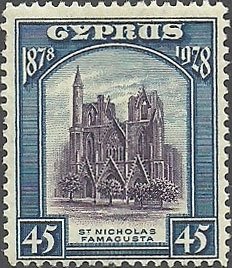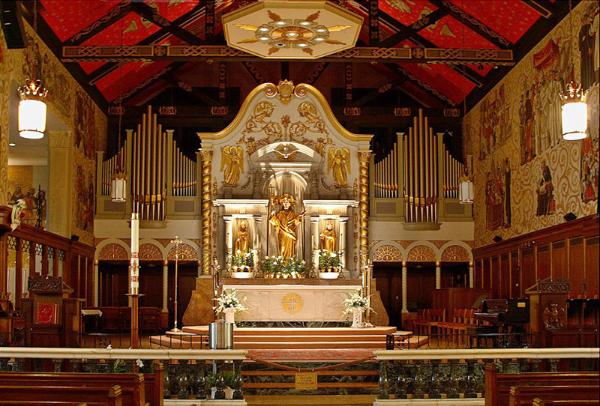Stamp: Church of St. Nicholas, Famagusta (Cyprus 1928)
Church of St. Nicholas, Famagusta (Cyprus 1928)
01 January (Cyprus ) within release British Authority goes into circulation Stamp Church of St. Nicholas, Famagusta face value 45 Cypriot cent
| Stamp Church of St. Nicholas, Famagusta in catalogues | |
|---|---|
| Michel: | Mi:CY 116 |
| Yvert et Tellier: | Yt:CY 114 |
Stamp is vertical format.
Also in the issue British Authority:
- Stamp - Silver Coin of Amathus face value ¾;
- Stamp - Zeno of Kitium (Philosopher) face value 1;
- Stamp - Map of Cyprus and Coat of Arms face value 1½;
- Stamp - The discovery of the relics of Apostle Barnabas face value 2½;
- Stamp - Archway, Bellapaix Monastery, Kyrenia face value 4;
- Stamp - British Coat of Arms in Cyprus face value 6;
- Stamp - Tekke of Umm-Haram, Larnaca face value 9;
- Stamp - The statue of Richard the Lionheart in London face value 18;
- Stamp - Church of St. Nicholas, Famagusta face value 45;
- Stamp - King George V face value 1;
Stamp Church of St. Nicholas, Famagusta it reflects the thematic directions:
A church building, often simply called a church, is a building used for Christian religious activities, particularly worship services. The term in its architectural sense is most often used by Christians to refer to their religious buildings, but it is sometimes used (by analogy) for buildings of other religions. In traditional Christian architecture, the church is often arranged in the shape of a Christian cross. When viewed from plan view the longest part of a cross is represented by the aisle and the junction of the cross is located at the altar area. Towers or domes are often added with the intention of directing the eye of the viewer towards the heavens and inspiring church visitors. Modern church buildings have a variety of architectural styles and layouts; many buildings that were designed for other purposes have now been converted for church use; and, similarly, many original church buildings have been put to other uses. The earliest identified Christian church was a house church founded between 233 and 256. During the 11th through 14th centuries, a wave of building of cathedrals and smaller parish churches occurred across Western Europe. A cathedral is a church, usually Roman Catholic, Anglican, Oriental Orthodox or Eastern Orthodox, housing the seat of a bishop.
An anniversary is the date on which an event took place or an institution was founded in a previous year, and may also refer to the commemoration or celebration of that event. For example, the first event is the initial occurrence or, if planned, the inaugural of the event. One year later would be the first anniversary of that event. The word was first used for Catholic feasts to commemorate saints. Most countries celebrate national anniversaries, typically called national days. These could be the date of independence of the nation or the adoption of a new constitution or form of government. The important dates in a sitting monarch's reign may also be commemorated, an event often referred to as a "Jubilee".


